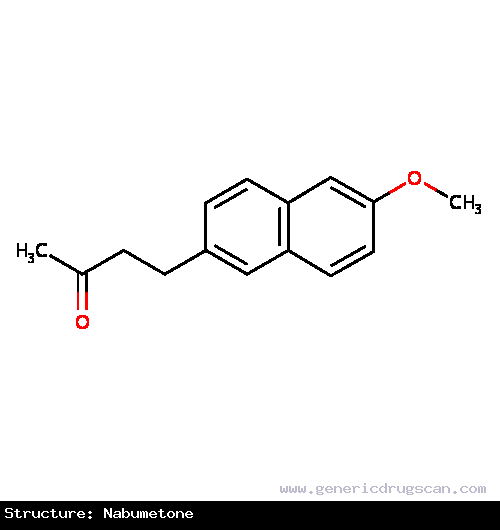Nabumetone Drug: Indication, Dosage, Precaution, Side Effect , Storage, Category Type and corresponding Brands - www.genericdrugscan.com
Nabumetone
Drug Status in USA : ApprovedDrug Status in Canada : Approved
pronunciation
pronounced as (na byoo' me tone)
Why is this medication prescribed?
Nabumetone is used to relieve pain, tenderness, swelling, and stiffness caused by osteoarthritis (arthritis caused by a breakdown of the lining of the joints) and rheumatoid arthritis (arthritis caused by swelling of the lining of the joints). Nabumetone is in a class of medications called NSAIDs. It works by stopping the body's production of a substance that causes pain, fever, and inflammation.
How should this medicine be used?
Nabumetone comes as a tablet to take by mouth. It is usually taken once or twice a day with or without food. Take nabumetone at around the same time(s) every day. Follow the directions on your prescription label carefully, and ask your doctor or pharmacist to explain any part you do not understand. Take nabumetone exactly as directed. Do not take more or less of it or take it more often than prescribed by your doctor.
Your doctor may start you on a low dose of nabumetone and gradually increase your dose.
What are the precautions to be followed?
Before taking nabumetone,- tell your doctor and pharmacist if you are allergic to nabumetone, aspirin or other NSAIDs such as ibuprofen (Advil, Motrin) and naproxen (Aleve, Naprosyn), or any other medications.
- tell your doctor and pharmacist what prescription and nonprescription medications, vitamins, nutritional supplements, and herbal products you are taking or plan to take. Be sure to mention the medications listed in the IMPORTANT WARNING section and any of the following: angiotensin-converting enzyme (ACE) inhibitors such as benazepril (Lotensin), captopril (Capoten), enalapril (Vasotec), fosinopril (Monopril), lisinopril (Prinivil, Zestril), moexipril (Univasc), perindopril (Aceon), quinapril (Accupril), ramipril (Altace), and trandolapril (Mavik); diuretics ('water pills'); lithium (Eskalith, Lithobid); oral medications for diabetes; phenytoin (Dilantin, Phenytek); and methotrexate (Rheumatrex). Your doctor may need to change the doses of your medications or monitor you carefully for side effects.
- tell your doctor if you have or have ever had asthma, especially if you also have frequent stuffed or runny nose or nasal polyps (swelling of the lining of the nose); swelling of the hands, feet, ankles, or lower legs; or kidney or liver disease.
- tell your doctor if you are pregnant, especially if you are in the last few months of your pregnancy, you plan to become pregnant, or you are breast-feeding. If you become pregnant while taking nabumetone, call your doctor.
- if you are having surgery, including dental surgery, tell the doctor or dentist that you are taking nabumetone.
- plan to avoid unnecessary or prolonged exposure to sunlight and to wear protective clothing, sunglasses, and sunscreen. Nabumetone may make your skin sensitive to sunlight.
What are possible side effects of this medication ?
Nabumetone may cause side effects. Tell your doctor if any of these symptoms are severe or do not go away:- diarrhea
- constipation
- gas or bloating
- dizziness
- headache
- dry mouth
- sores in the mouth
- nervousness
- difficulty falling asleep or staying asleep
- increased sweating
- ringing in the ears
- unexpected weight gain
- yellowing of the skin or eyes
- lack of energy
- loss of appetite
- nausea
- pain in the upper right part of the stomach
- flu-like symptoms
- fever
- blisters
- rash
- itching
- hives
- swelling of the eyes, face, lips, tongue, throat, arms, hands, feet ankles, or lower legs
- difficulty breathing or swallowing
- hoarseness
- pale skin
- fast heartbeat
- cloudy, discolored, or bloody urine
- back pain
- difficult or painful urination
Nabumetone may cause other side effects. Call your doctor if you have any unusual problems while taking this medication.
How to store the medication and dispose it of after its use later?
Keep this medication in the container it came in, tightly closed, and out of reach of children. Store it at room temperature and away from excess heat and moisture (not in the bathroom). Throw away any medication that is outdated or no longer needed. Talk to your pharmacist about the proper disposal of your medication.
Drug Category/Class
- Cyclooxygenase 2 Inhibitors
- Cytochrome P-450 CYP1A2 Inhibitors
- Cytochrome P-450 CYP1A2 Inducers
- Antiinflammatory and Antirheumatic Products, Non-Steroids
- Antiinflammatory and Antirheumatic Products
- Musculo-Skeletal System
- Other antiinflammatory and antirheumatic agents, non-steroids
| Prescribed | For acute and chronic treatment of signs and symptoms of osteoarthritis and rheumatoid arthritis. |
| Weight : | 228.2863 |
| Structure | Nabumetone |
 | |
| Formula | C15H16O2 |
Nabumetone has 4 Brands listed
| Nabuflam (500 mg) | Nilitis (500 mg) |
| Nilitis (750 mg) | Nititis (500 mg) |
Search Generic Drugs alphabetically
